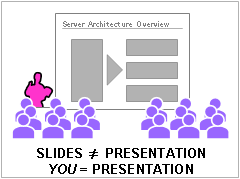
In November of last year, while returning from Chicago, I hit a deer approximately ten miles north of metropolitan Indianapolis. Fortunately, I survived the mishap without any injuries.
Sequence of Events
 The entire incident, from the moment I spotted the deer to when I hit the deer, happened in less than two seconds. Here is the sequence of events; see the accompanying illustration. (I used present tense to recall the incident.)
The entire incident, from the moment I spotted the deer to when I hit the deer, happened in less than two seconds. Here is the sequence of events; see the accompanying illustration. (I used present tense to recall the incident.)
- At 3:15am, I am cruising at 70mph (112 kmph) on an interstate highway. I am very alert. There is very little traffic. While negotiating a curve, I notice two deer enter my field of vision from the far left side of the interstate. “Ah, deer there.”
- Within moments, one of the deer starts to run cross the interstate. The other stands still. I realize I cannot avoid hitting the deer. I steady my grip on the steering wheel and try to hit the brake pedal. “Is this the end?”
- I crash into the deer. I get a glimpse of the deer in my windshield and feel a big impact. Suddenly, I see smoke everywhere on the dash. I also notice some sky-blue colored, cloth-like object in front of my body. “What has happened?”
- I clear the sky-blue colored object and realize I am still steady on the right lane. My speed has reduced to 30mph (48 kmph). I discover that the airbags (sky-blue colored) were just deployed and that the smoke is from the explosion-activation of the airbags. [See the ‘How Air Bags Work’ article on the How Stuff Works website.]
- I apply brakes and gradually come to stop on the pavement. I examine myself and perceive no injuries. I get out of my car and examine the mess. The impact is so bad that hair from the deer’s body have stuck to the corner of the bumper upon contact. The radiator is damaged. “I cannot drive any further.”
- I look back to see the deer or any remnants. I do not notice anything. I guess the deer rebounded from the car, ran away from the interstate and passed away by the side of the road. “Why did this happen to me?”
- I notice a few lights down the interstate and guess I could reach an exit before long. I drive slowly, stop at a gas station at the exit and call the police. After a couple of hours, I get my car towed to a Honda service station and have my friend pick me up from there.
For the next six weeks, I depended on my neighbors and friends to drive me around town. Luckily, the insurance company decided not to total my car and paid nearly $8,000 to fix the damages.

My Seatbelt Saved my Life
 In retrospect, I was very fortunate that I survived the accident.
In retrospect, I was very fortunate that I survived the accident.
- The only injury I had was a scratch on my right-wrist. Passenger-side airbags are usually folded into the middle section of the steering wheel. This section cracked open to activate the airbag and thus scratched my wrist.
- Had I not held the steering wheel firmly, I may have swerved off the lane I was in.
- Had the deer started running across the interstate a few moments later, it would have hit the side of my car. The side of my car is not as protected for impact as the front.
- Had the deer started running across the interstate a few moments sooner, it would have hit the middle section of the front of my car. The impact could have been worse; the deer could have landed on my windshield.
- Had there been traffic on the interstate, any vehicle behind my car would have hit me.
- I do not remember my chest or face coming in contact with the airbag. My seatbelt had restrained me thoroughly. My seatbelt had saved my life.
In the second half on this topic, I will feature precautions we can take to avoid deer hits.
 All of us have an innate desire to be appreciated and valued for our contributions at work, home and elsewhere. However, we often fail to recognize the positive contributions of people around us. We neglect opportunities to talk about them in positive regard, appreciate their work and encourage them.
All of us have an innate desire to be appreciated and valued for our contributions at work, home and elsewhere. However, we often fail to recognize the positive contributions of people around us. We neglect opportunities to talk about them in positive regard, appreciate their work and encourage them. Last week, I attended a training seminar where the speaker stood by the side of a projection screen and behind a table where he had his laptop. He hardly moved from his position during the hour-long seminar. He was short and was barely visible from the back of the thirty-people room, as shown in the illustration. Despite his interesting content and compelling arguments, he was physically disconnected from his audience.
Last week, I attended a training seminar where the speaker stood by the side of a projection screen and behind a table where he had his laptop. He hardly moved from his position during the hour-long seminar. He was short and was barely visible from the back of the thirty-people room, as shown in the illustration. Despite his interesting content and compelling arguments, he was physically disconnected from his audience. Below is a list (in order) of the twelve most persuasive words that have proven to be most influential on listeners’ or readers’ minds. Often, advertisements consist of crafty constructions of these words. Surprisingly, the word ‘free’ is absent. The Language Log website at the University of Pennsylvania has an
Below is a list (in order) of the twelve most persuasive words that have proven to be most influential on listeners’ or readers’ minds. Often, advertisements consist of crafty constructions of these words. Surprisingly, the word ‘free’ is absent. The Language Log website at the University of Pennsylvania has an